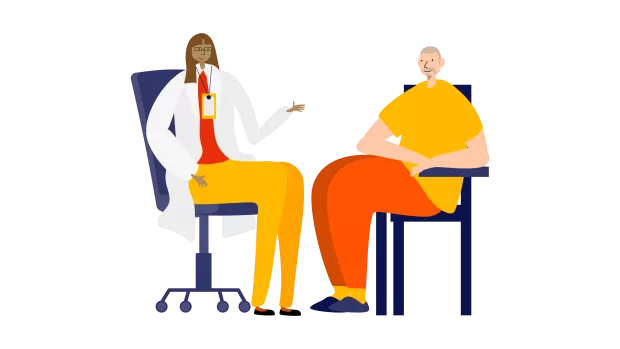
Ofatumumab (Kesimpta)
Ofatumumab is a disease modifying therapy (DMT) for ‘active’ relapsing MS. Its brand name is Kesimpta and you take it as an injection.
Read the latest information about DMTs and coronavirus COVID-19
- Who can take ofatumumab (Kesimpta)?
- How does ofatumumab (Kesimpta) work?
- How well does ofatumumab (Kesimpta) work?
- What are the side effects of ofatumumab (Kesimpta)?
- Ofatumumab (Kesimpta) and pregnancy, breastfeeding and contraception
Who can take ofatumumab (Kesimpta)?
You can have ofatumumab (Kesimpta) across the UK if:
- you have ‘active’ relapsing MS. That means you’ve had a recent relapse and/or MRI scans show that you have new lesions.
You might be offered ofatumumab as your first DMT, or if the one you’re already taking isn’t controlling your MS well enough.
How does ofatumumab (Kesimpta) work?
Special types of cells in your immune system called B cells are thought to cause a lot of the damage in MS. They normally kill viruses and bacteria that get into your body, but in MS they damage your nerves. They do this by stripping off the covering of myelin from nerves in your brain and spinal cord. Myelin protects nerves from damage, and helps messages travel along them.
Ofatumumab (Kesimpta) destroys B cells so that there are fewer left to damage the myelin covering around your nerves. The drug reduces how much inflammation is seen on your MRI scans. Doctors can see this inflammation as lesions, areas of damage to nerves.
You inject ofatumumab under your skin with an injector pen once every four weeks. With other monoclonal antibody drugs you must go to hospital for an infusion (they give you the drug through a drip). But ofatumumab is the first drug of this kind that you can treat yourself with at home. A trained person such as a nurse will teach you how to use the injector pen.
How well does ofatumumab (Kesimpta) work?
Two trials compared ofatumumab to a drug already used to treat MS called teriflumonide (brand name Aubagio). Ofatumumab was significantly better than teriflunomide at reducing how many relapses people got. It was also better at reducing how many lesions doctors could see on MRI scans.
Relapses dropped by: 51-59% compared to teriflunomide.
This means that in the trials, over two and a half years, on average people saw a drop of 51-59% in the number of relapses they had. This was compared to people who took teriflunomide.
Disability getting worse was slowed down by up to 34% compared to teriflunomide.
This means that in the two trials, on average, people saw a drop of up to 34% in the risk of their disability getting worse. This was compared to people who took teriflunomide.
What are the side effects of ofatumumab (Kesimpta)?
After injecting the drug, around one in five people get a reaction such as headache or flushing (going red). Around one in ten have a reaction in the skin for a couple of days where they inject. This happens mostly the first time that people inject.
In the trials more than one in ten people got colds, chest infections, bladder and other urinary tract infections, or headaches. This was similar to what people got who took teriflunomide.
Ofatumumab (Kesimpta) and pregnancy, breastfeeding and contraception
Pregnancy
Ofatumumab (Kesimpta) doesn’t have a licence to be used in pregnancy. But new guidelines for UK neurologists in 2022 said it can be used if you want to get pregnant. The guidelines say you can take this drug up until you know you've become pregnant. After that, usually you'll stop treatment until your baby is born. There might be individual cases where a neurologist will recommend treatment with this drug during a pregnancy.
If you stop taking this drug, you can try to get pregnant straight away after your final injection. There’s no need for a ‘washout period’. That’s the period of time you must wait until the drug is out of your system, making it safe to get pregnant.
If you do decide to stop this drug to have a baby, you should go back on it straight after the birth to cut the risk of a relapse.
Because this drug is relatively new, some neurologists are more cautious about using it with women who want to be pregnant than the guidelines that came out in 2022.
If you and your partner want to have a child, discuss this with your neurologist. If you think you’ve become pregnant, let your medical team know at once. Never stop your DMT without first getting their advice.
Breastfeeding
New UK guidelines in 2022 said that it’s safe to breastfeed on this drug and that this should be encouraged. Ask your medical team for their advice.
Contraception
The new 2022 ofatumumab (Kesimpta) guidelines for UK neurologists said that previous advice about the need to use contraception to avoid pregnancy was too cautious. As these guidelines say you can get pregnant while on this drug, they had no recommendations about using contraception.


